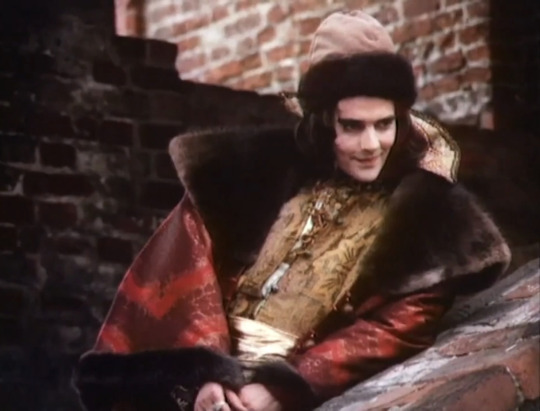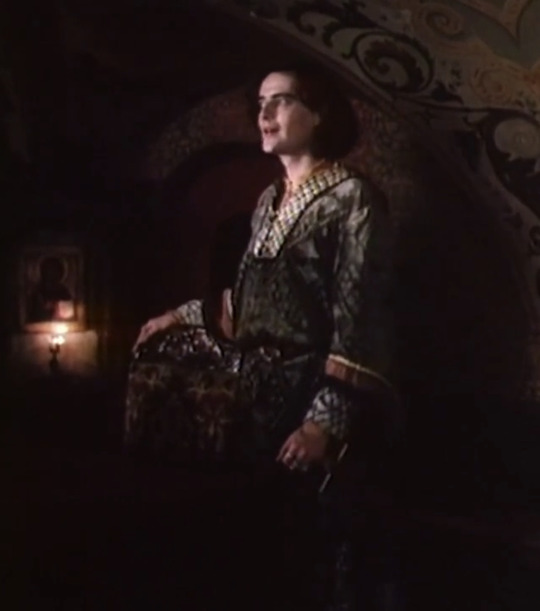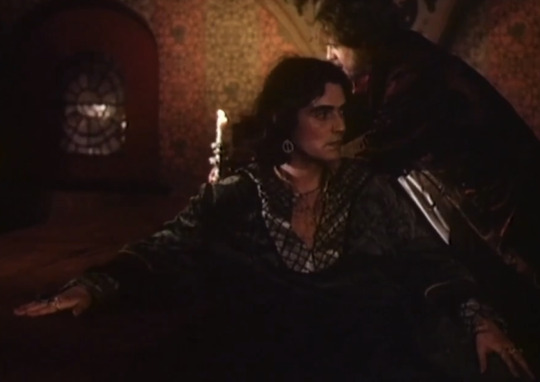#inspired by fyodor basmanov
Text






Just a borderline psychotic little guy who will do anything for the man he loves.
Backstory:
Sarnemin Rellias Galbaver was born August 27th, 1215. He was born to a wealthy family in Vemor, the small port town on the banks of the Carigsard river. His father, Lanreth was very hard on him and often cut off Sarnemin’s hair, despite the boy’s insistence on wanting to keep it. Sarnemin was always a feminine child, and enjoyed things his sisters did. His father thought it would just go away, but it didn’t. It only got more evident as he grew.
He learned how to sew and embroider from his mother and became quite skilled at it. His father disapproved of this and pushed him towards more masculine pursuits. Sarnemin’s fighter side didn’t go untapped though and he became incredibly skilled with a dagger he kept hidden on his belt.
Sarnemin had a difficult childhood due to his father's harsh treatment, but he found solace in music. He taught himself to play the lute and would often sneak out at night to play for the townspeople. His talent was quickly recognized, and he was eventually hired to perform at local taverns and inns. He began growing out his hair and made a name for himself. It is said that Sarnemin's performances were so captivating that they drew the attention of a visiting nobleman. The nobleman was so impressed with Sarnemin's talent that he offered to take the young musician under his wing and teach him the ways of courtly life. Sarnemin accepted the offer and was soon introduced to the world of high society.
He continued to play music and it was there that he met Kazimir Bavrild, a greatly feared warrior. After meeting Kazimir, Sarnemin's interest in fighting and combat grew. He began training with the warrior, learning how to wield a sword and use his dagger more effectively. Sarnemin also found himself drawn to Kazimir in other ways, and the two soon became lovers.
As Kazimir Bavrild's lover and confidant, Sarnemin held significant influence in the Zalstian court. He was known for his sharp wit and extravagant tastes, and often advised Kazimir on matters of strategy and politics. Sarnemin had a reputation for throwing lavish parties and entertaining guests with his storytelling and musical performances. He surrounded himself with a group of artists and intellectuals, who were seen as the cultural elite of the Zalstian court. While some viewed Sarnemin's flamboyant personality and love of luxury as a distraction from more pressing matters, others saw him as a necessary counterbalance to the seriousness and militaristic focus of Kazimir and his followers. Regardless of how one viewed him, it was clear that Sarnemin was a powerful figure in the Zalstian court, and his influence was felt in all areas of the city's culture and politics.
He is now part of a task force of soldiers known was the Sobraniye. They often deal with less than present visitors and protect the prince and his family. The Sobraniye are known to be quite violent at times, Sarnemin too, doesn’t shy away from violence despite his appearance.
Despite his reputation for flamboyance and love of luxury, Sarnemin was a capable fighter and often accompanied the Sobraniye on their missions. His skills with a sword and dagger were unmatched, and he had a keen eye for strategy and tactics, which he used to great effect in battle.
Sarnemin's presence in the Sobraniye was a controversial one, as some members of the group believed that his flamboyant personality and lack of seriousness were a liability in combat. However, others recognized the value of having someone with Sarnemin's skill level.
Over time, Sarnemin proved himself to be a valuable asset to the Sobraniye. He played a crucial role in several successful missions, and his influence in the Zalstian court helped the group gain valuable resources and support. Despite his love of luxury and extravagance, Sarnemin was fiercely loyal to his comrades and dedicated to protecting the prince and his family at all costs.
#my guy loves to partayyyy#he’s drunk like 90% of the time#Just a little queer medieval guy#a cunning lad#definitely slightly psychotic#inspired by fyodor basmanov#oc#historical oc#worldbuilding#queer oc#lgbtq#queer history#story writing#Sarnemin Galbaver#cocky bastard
4 notes
·
View notes
Note
Do you know of any other characters similar to Xi'er and Fyodor Basmanov, the looks-cute-but-is-actually-evil kind (or at least does some pretty bad stuff) ?
Thank you for this ask, Anon! I've been thinking about the similarities between Xie'er and Fyodor recently, and now you gave me the nudge to write about them. x)
If we take only this looks-cute-but-is-actually-evil kind (or at least does some pretty bad stuff) criterion, then there are tons of characters who fit this description: from many anime villains and anti-heroes to, say, Damien from Omen or Tom Ripley from The Talented Mr. Ripley.

However, Xie’er and Fyodor have much more in common than this, in terms of character dynamics, tropes associated with them, etc:
- Both are young men, who are utterly, fanatically devoted to their mentors - older men in the position of power and authority.
- Their relationship with their mentors has sexual undertones: quite unambiguous in case of Fyodor and Ivan (historically true, and Eisenstein’s movie reflects it as much as it was possible in the 40s in the USSR), and more like a one-sided crush in case of Xie’er. Opinions may differ but personally I believe Wang Ruolin’s words that he didn’t portray Zhao Jing’s feeling for Xie’er as sexual, and that from Zhao Jing’s side it was only parental love (in his interpretation Zhao Jing didn’t intend to kill or harm Xie’er). There are hints that smth sexual does go on between them, but in any case Zhao Jing sees Xie’er and himself as first and foremost “father and son” while Xie’er would definitely prefer “lovers”.
- Both Xie’er and Fyodor are ready to kill and to be killed for the sake of their mentors.
- Both find pleasure in killing - especially killing those who disrespect their crush idol mentor.
- Both are connected to a sinister and murderous organization: Xie’er leads “Venomous Scorpions”, Fyodor is one of the leaders of the tsar’s terror squad, the Oprichniki.
- Their personalities are shaped by their mentors, and not in a good way: pure-hearted Fyodor is corrupted by Ivan’s influence, Xie’er is groomed by Zhao Jing to be his obedient tool, his secret murder weapon.
- Both have feminine features, and both fulfill the roles of wives for their mentors:
Xie’er wears heavy makeup, his hanfu looks similar to a woman’s because of its light fabric and frilly skirt. In daily life he performs the duties of Zhao Jing’s wife: taking care of home, choosing furniture, preparing tea, etc. He also strongly identifies himself with female lovers like Liu Qianqiao and Luo Fumeng.
Fyodor serves as a replacement of Ivan’s dead wife, Anastasia, being directly offered by his father to the tsar as such. During the banquet he dances in female dress, with Anastasia‘s ryasna (a kind of traditional Slavic temporal jewelry, which she wears during the wedding) attached to his mask. (More about Anastasia and Fyodor here: https://siumerghe.tumblr.com/post/161387702250/sergei-eisensteins-ivan-the-terrible-anastasia)


- Both are prone to jealousy: Xie’er is jealous to Xie Wuyang, Song Huairen, Wuchang Gui and basically to anyone who steals his yifu’s attention, Fyodor - to Vladimir.
- Their mentors are their one and only passion, the axis of their lives, but in the end this passion becomes their undoing: Xie’er continues to pursue Zhan Jing’s dream and chooses to die together with Zhao Jing, Ivan unintentionally causes Fyodor’s death in the unfinished Part III of Eisenstein’s movie. (Historically, it’s unclear what happened to Fyodor: he isn’t mentioned anywhere after his father’s execution, but his wife and children didn’t suffer exile. Most popular versions are that he was either executed together with his father or became/was forced to become a monk.)
Also I have an impression that some Zhaoxie scenes from Word of Honor are sort of inspired by Eisenstein’s Ivan the Terrible. (Although, in the modern cinematography, what isn’t inspired by Eisenstein?! The man was a genius. Too bad Stalin was an asshole, to put it mildly.)



(Screenshot in the middle is from Tsar Ivan the Terrible 1991, adaptation of novel Prince Serebrenni by A.K.Tolstoy)
While searching for screenshots for this post I found this video that I liked so I put it here as well:
https://youtu.be/lp9-dZnpPiE
youtube
Now, back to the original question: do I know any similar characters?
Unfortunately, I don’t. Sorry to disappoint, Anon. If anyone can help, please, do!
There is a slightly similar pairing dynamics in the Chinese tv-series Men with Sword: a general utterly devoted to his not quite good-natured king, for whom he is ready both to kill others and to sacrifice his life, but neither of them are evil, and their age difference isn’t big, so it’s a loose similarity at best.
Update: I think Littlefinger and Sansa Stark (from the books! not from the tv series!) are a bit similar. It’s unclear what are they to each other: secret lovers? Father and daughter? Mentor and pupil? Seems like everything at once. He is slowly corrupting her but at the same time she is his princess, his little treasure. And she benefits from his lessons and becomes smarter and more self-confident.
Also, perhaps, this will be of use:
https://tvtropes.org/pmwiki/pmwiki.php/Main/FaceOfAnAngelMindOfADemon
46 notes
·
View notes
Text
Sergei Eisenstein’s “Ivan the Terrible”

First of all - it would be a mistake to treat Ivan the Terrible as a historical film. The stylization after opera and Shakespeare's plays, such as Hamlet, King Lear, Macbeth, is deliberate: Eisenstein himself defined Ivan the Terrible as "tragedy in the Shakespearean mode". Indeed: this film tells about real Ivan IV, the first Russian tsar, as much as Hamlet tells about real 12th-century Amleth.
Ivan the Terrible sacrifices historicity for the sake of aesthetics and story: many important events are simplified or omitted, the chronology is not always correct, Ivan IV was officially married at least 4 times, Efrosinia Staritskaya wasn't the sole head of the boyar opposition, Vladimir Staritsky wasn't mentally deficient, Grigory "Malyuta" Skuratov entered the tsar retinue well after the depicted events, the Basmanovs weren't commoners, etc.
By many inaccuracies and generalizations Eisenstein makes the point that he creates neither biopic nor historical epic, but a many-layered timeless parable. As the first opening credits say, in large letters: "This is a film about a man...". It’s hard to add anything more specific because of all the themes Ivan the Terrible incorporates. Is it about tyranny? Or about a man assuming the role of god? Or being lonely at the top? Or is it a desperate outcry against cruelty and autocracy? Or about the road to hell which is paved with good intentions? About revenge and retaliation - the cycle of violence which never breaks?
Like with Mona Lisa's smile - a multitude of interpretations is possible.
Ivan the Terrible combines both the elements of the classical European theater based on Shakespeare's plays, and the Asian theatrical tradition with its emphasize on gesture, pose, movement. The characters' faces seem to be inspired by Renaissance paintings but the body language is influenced by Noh and Kabuki performance. And the Peking opera, of course: not surprising, considering Eisenstein's friendship with Mei Lanfang, the famous performer of female roles, whom he filmed during Mei Lanfang's visit to USSR in 1935.
The actors speak in over-the-top theatrical, unnatural manner. Their movements are symbolic and suggestive, rather than realistic. Similar to Peking opera, Ivan the Terrible presents idealized, generalized images, that convey spiritual likeness of people, which stimulates viewer's imagination - not just a formal, physical resemblance.

While working on the film, Eisenstein thought in terms of lines, shapes, rhythm, and he demanded from actors a special kind of movement plastic. Eisenstein even wanted to cast great ballerina Galina Ulanova as Anastasia. As he wrote in the diary, "an act of movement is at the same time an act of thinking, and a thought - at the same time - is an action in space" ("двигательный акт есть одновременно акт мышления, а мысль - одновременно - пространственное действие"). This approach is especially noticeable in the scene where Ivan tries to stop metropolitan Philip from leaving in Part II - it’s a peerless choreographic sequence, with all that cloak pulling and mantle trampling.
I can only wonder - why Ivan the Terrible hasn’t been made into an opera yet?! Sergei Prokofiev’s score is magnificent. The film contains so much singing that it's already almost an opera: the wedding celebration hymn, the song of cannoniers, the Fiery Furnace performance, Efrosinia’s lullaby, Fyodor’s song... The frenzied dance of the Oprichniki in Part II reminds of the Polovtsian Dances from Prince Igor.

It's worth noting that "Ivan the Terrible" is a mistranslation. Ivan’s nickname, "Grozny", has nothing to do with terror and doesn't have a bad meaning. Sometimes it's translated into English as "Ivan the Fearsome", which is slightly more correct. In fact, the adjective "grozny" is derived from the Russian word "groza" - "thunderstorm". (That's why thunderstorm clouds serve as background for the film credits.) In older Russian "groza" also meant "threat" (the modern form - "ugroza"). One of the Russian dictionaries explains the word "grozny" as "courageous, magnificent, magisterial and keeping enemies in fear, but people in obedience". But, in my opinion, the best definition is provided by TVtropes.org: "terrifying yet awesome" - like a thunderstorm.

Another thing which may be confusing for a non-Russian viewer is who were the Oprichniki and why they are considered bad guys. In short, the Oprichniki were the tsar's personal punitive army with a dash of Inquisition. They dressed in black and emulated the monastic life; they weren't controlled by laws and answered only to the tsar. With their help Ivan IV established his autocratic reign: in uprooting any opposition the Oprichniki extensively used tortures, mass murders and gruesome executions.
Next >>
45 notes
·
View notes